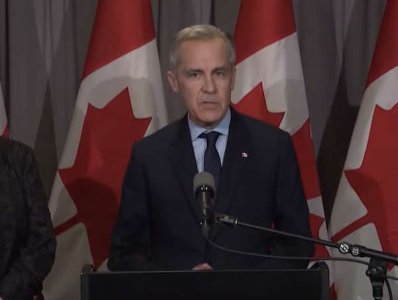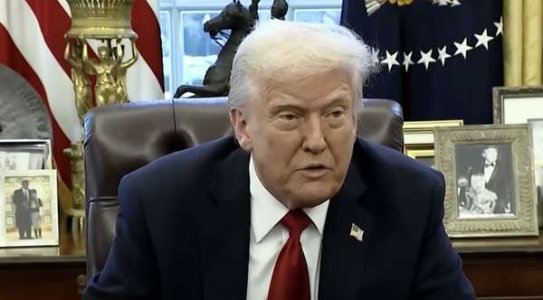Trade tensions rise between US and Canada—tariff decisions pending
- Replies 0
Disclaimer: This is an ongoing story, and new developments may arise. The information provided is based on currently available sources. Readers are encouraged to stay informed through official statements.
Tensions are flaring across North America’s longest border.
In a sharp rebuke to President Trump’s new wave of tariffs, Canadian Prime Minister Mark Carney has vowed to respond decisively—with retaliatory tariffs of his own.
April 2 is shaping up to be a pivotal moment in US-Canada relations, and for consumers, investors, and businesses alike, the fallout could be significant.
Here’s what’s unfolding—and why it matters.
Canadian Prime Minister Mark Carney informed President Donald Trump on Friday that Canada would retaliate against the United States with its own tariffs if Trump moves forward with his planned levies.
The potential for an all-out trade war continues to grow as both nations prepare for a new round of tariffs that could further damage their economies.
The call between Carney and Trump came just days before the White House is set to impose tariffs on April 2, a date Trump has called America’s “Liberation Day.”

This follows Trump’s announcement on Wednesday that he would impose new tariffs on automobiles and parts, breaking decades of free trade agreements between the two neighboring countries.
Carney’s office issued a statement confirming that Canada intends to impose retaliatory tariffs on US goods starting next week, responding directly to the US tariffs set for implementation.
However, the Prime Minister’s office refrained from providing specifics regarding the timing or the full scope of these retaliatory measures.
“The Prime Minister informed the President that his government will implement retaliatory tariffs to protect Canadian workers and our economy, following the announcement of additional US trade actions on April 2, 2025,” Carney’s office said in a press release.
Despite the tensions, the leaders emphasized a cooperative tone in their discussion, which marks the first official conversation between Carney and Trump.
Both leaders expressed a more positive outlook after the call compared to the fraught relations that characterized Trump’s interactions with former Prime Minister Justin Trudeau.
The Prime Minister’s office described the call as “very constructive,” and Trump, in a social media post, stated that the conversation had been “extremely productive.”
The leaders agreed to begin comprehensive negotiations aimed at establishing a new economic and security relationship once Canada’s federal election takes place on April 28.
In the meantime, both nations are expected to engage in intensified ministerial-level talks to address immediate trade concerns.
Carney warned that the trade relationship between Canada and the United States had fundamentally shifted due to the threats of tariffs.
He added that Canada has a range of measures available to respond to any actions taken by the US administration, signaling a readiness to act if necessary.
While Carney was firm in his stance, Trump, speaking to reporters aboard Air Force One on Friday, expressed some openness to negotiating tariff deals with other countries after his tariffs are implemented.
Trump has long accused other nations, including Canada, of taking advantage of the United States in trade agreements.
“It’s possible if we can get something for the deal,” Trump said when asked about negotiations with countries like the United Kingdom that have discussed reducing tariffs on US products.
However, Trump indicated that any negotiations would come after the tariffs go into effect. "But, you know, we’ve been taken advantage of for 40 years, maybe more, it’s just not going to happen anymore," he stated.
Trump also reiterated his plans to impose tariffs on pharmaceuticals soon, although he did not provide specific details regarding the rates.
He explained that the goal was to bring pharmaceutical manufacturing back to the US, to reduce reliance on foreign countries for essential supplies, such as those seen during the COVID-19 pandemic.

Despite the heightened rhetoric, Trump downplayed any change in his relationship with Canada following the call with Carney.
“I’ve always loved Canada, and we had a very good conversation,” Trump said, maintaining his usual praise for the country despite the trade tensions.
This latest dispute is a continuation of a series of trade clashes between the US and Canada.
Previously, Canada responded to US tariffs on steel and aluminum with retaliatory measures, including a 25% tariff on over $20 billion worth of US goods, such as dairy products, meats, grains, wine, beer, and motorcycles.
Canada also warned that it could impose additional tariffs on up to $86 billion of US goods if the US tariffs remained in place.
On March 1, former Prime Minister Justin Trudeau criticized the US for its aggressive tariff policies, calling the situation “a very dumb thing to do.”
He emphasized that the trade war between close allies was exactly what their global opponents wanted to see. Ontario Premier Doug Ford also joined the fray, imposing a 25% surcharge on electricity exported to New York, Michigan, and Minnesota.
Ford estimated that the surcharge would add around $100 per month to American electricity bills, warning that if the US tariffs weren’t lifted, he would halt all electricity exports to the United States.
Trump responded to Ford’s threats with the possibility of a 50% tariff on Canadian steel and aluminum, an increase from the initial 25% tariff imposed in March.
However, both Ford and Trump ultimately backed down, with Ford removing the surcharge, signaling a temporary cooling of tensions between the two leaders.
The ongoing tariff back-and-forth highlights the damaging consequences of trade wars.
Leaders in Canada and China have repeatedly stated that no one truly benefits from such conflicts.
The uncertainty around retaliatory tariffs and potential economic fallout continues to cause concern for businesses and consumers on both sides of the border.
It remains unclear how the Trump administration will respond to Canada’s threatened retaliatory tariffs, especially given the US president’s history of targeting Canadian imports like dairy.
Although Trump has suggested a tariff of up to 250% on Canadian dairy, it is largely seen as a hollow threat due to the low volume of dairy imports from Canada to the United States.
However, he has also suggested placing significant tariffs on Canadian timber, which could severely affect the price of lumber in the US.
In a similar fashion, after the European Union retaliated against US steel and aluminum tariffs, Trump threatened to impose a 200% tariff on European alcohol.
However, the EU delayed its retaliation, and Trump has yet to follow through on his threat, leaving many to wonder whether similar tariffs will be imposed on Canada.

Have you felt the effects of trade tensions in your daily life or investments? Do you have insights or concerns about the future of US-Canada relations? Share your thoughts and experiences in the comments below. Let's navigate these choppy economic waters together, armed with knowledge and a sense of community.
Read more:
Tensions are flaring across North America’s longest border.
In a sharp rebuke to President Trump’s new wave of tariffs, Canadian Prime Minister Mark Carney has vowed to respond decisively—with retaliatory tariffs of his own.
April 2 is shaping up to be a pivotal moment in US-Canada relations, and for consumers, investors, and businesses alike, the fallout could be significant.
Here’s what’s unfolding—and why it matters.
Canadian Prime Minister Mark Carney informed President Donald Trump on Friday that Canada would retaliate against the United States with its own tariffs if Trump moves forward with his planned levies.
The potential for an all-out trade war continues to grow as both nations prepare for a new round of tariffs that could further damage their economies.
The call between Carney and Trump came just days before the White House is set to impose tariffs on April 2, a date Trump has called America’s “Liberation Day.”

Canadian Prime Minister Mark Carney has warned President Donald Trump that Canada will retaliate with tariffs of its own. Image source: CNN / YouTube
This follows Trump’s announcement on Wednesday that he would impose new tariffs on automobiles and parts, breaking decades of free trade agreements between the two neighboring countries.
Carney’s office issued a statement confirming that Canada intends to impose retaliatory tariffs on US goods starting next week, responding directly to the US tariffs set for implementation.
However, the Prime Minister’s office refrained from providing specifics regarding the timing or the full scope of these retaliatory measures.
“The Prime Minister informed the President that his government will implement retaliatory tariffs to protect Canadian workers and our economy, following the announcement of additional US trade actions on April 2, 2025,” Carney’s office said in a press release.
Despite the tensions, the leaders emphasized a cooperative tone in their discussion, which marks the first official conversation between Carney and Trump.
Both leaders expressed a more positive outlook after the call compared to the fraught relations that characterized Trump’s interactions with former Prime Minister Justin Trudeau.
The Prime Minister’s office described the call as “very constructive,” and Trump, in a social media post, stated that the conversation had been “extremely productive.”
The leaders agreed to begin comprehensive negotiations aimed at establishing a new economic and security relationship once Canada’s federal election takes place on April 28.
In the meantime, both nations are expected to engage in intensified ministerial-level talks to address immediate trade concerns.
Carney warned that the trade relationship between Canada and the United States had fundamentally shifted due to the threats of tariffs.
He added that Canada has a range of measures available to respond to any actions taken by the US administration, signaling a readiness to act if necessary.
While Carney was firm in his stance, Trump, speaking to reporters aboard Air Force One on Friday, expressed some openness to negotiating tariff deals with other countries after his tariffs are implemented.
Trump has long accused other nations, including Canada, of taking advantage of the United States in trade agreements.
“It’s possible if we can get something for the deal,” Trump said when asked about negotiations with countries like the United Kingdom that have discussed reducing tariffs on US products.
However, Trump indicated that any negotiations would come after the tariffs go into effect. "But, you know, we’ve been taken advantage of for 40 years, maybe more, it’s just not going to happen anymore," he stated.
Trump also reiterated his plans to impose tariffs on pharmaceuticals soon, although he did not provide specific details regarding the rates.
He explained that the goal was to bring pharmaceutical manufacturing back to the US, to reduce reliance on foreign countries for essential supplies, such as those seen during the COVID-19 pandemic.

Trump downplayed any change in his relationship with Canada following the call with Carney. Image source: CNN / YouTube
Despite the heightened rhetoric, Trump downplayed any change in his relationship with Canada following the call with Carney.
“I’ve always loved Canada, and we had a very good conversation,” Trump said, maintaining his usual praise for the country despite the trade tensions.
This latest dispute is a continuation of a series of trade clashes between the US and Canada.
Previously, Canada responded to US tariffs on steel and aluminum with retaliatory measures, including a 25% tariff on over $20 billion worth of US goods, such as dairy products, meats, grains, wine, beer, and motorcycles.
Canada also warned that it could impose additional tariffs on up to $86 billion of US goods if the US tariffs remained in place.
On March 1, former Prime Minister Justin Trudeau criticized the US for its aggressive tariff policies, calling the situation “a very dumb thing to do.”
He emphasized that the trade war between close allies was exactly what their global opponents wanted to see. Ontario Premier Doug Ford also joined the fray, imposing a 25% surcharge on electricity exported to New York, Michigan, and Minnesota.
Ford estimated that the surcharge would add around $100 per month to American electricity bills, warning that if the US tariffs weren’t lifted, he would halt all electricity exports to the United States.
Trump responded to Ford’s threats with the possibility of a 50% tariff on Canadian steel and aluminum, an increase from the initial 25% tariff imposed in March.
However, both Ford and Trump ultimately backed down, with Ford removing the surcharge, signaling a temporary cooling of tensions between the two leaders.
The ongoing tariff back-and-forth highlights the damaging consequences of trade wars.
Leaders in Canada and China have repeatedly stated that no one truly benefits from such conflicts.
The uncertainty around retaliatory tariffs and potential economic fallout continues to cause concern for businesses and consumers on both sides of the border.
It remains unclear how the Trump administration will respond to Canada’s threatened retaliatory tariffs, especially given the US president’s history of targeting Canadian imports like dairy.
Although Trump has suggested a tariff of up to 250% on Canadian dairy, it is largely seen as a hollow threat due to the low volume of dairy imports from Canada to the United States.
However, he has also suggested placing significant tariffs on Canadian timber, which could severely affect the price of lumber in the US.
In a similar fashion, after the European Union retaliated against US steel and aluminum tariffs, Trump threatened to impose a 200% tariff on European alcohol.
However, the EU delayed its retaliation, and Trump has yet to follow through on his threat, leaving many to wonder whether similar tariffs will be imposed on Canada.
Key Takeaways
- Canadian Prime Minister Mark Carney has warned President Donald Trump that Canada will retaliate with tariffs of its own if Trump presses forward with his promised levies.
- The expected US tariffs, labelled by Trump as 'Liberation Day,' are set to take effect on April 2, potentially escalating the trade war.
- Both leaders have expressed a willingness to begin comprehensive negotiations about a new economic and security relationship after Canada’s federal election on April 28.
- Canada has already implemented retaliatory tariffs on US goods and has threatened further measures if the US tariffs are not lifted.
Read more:
Last edited:






